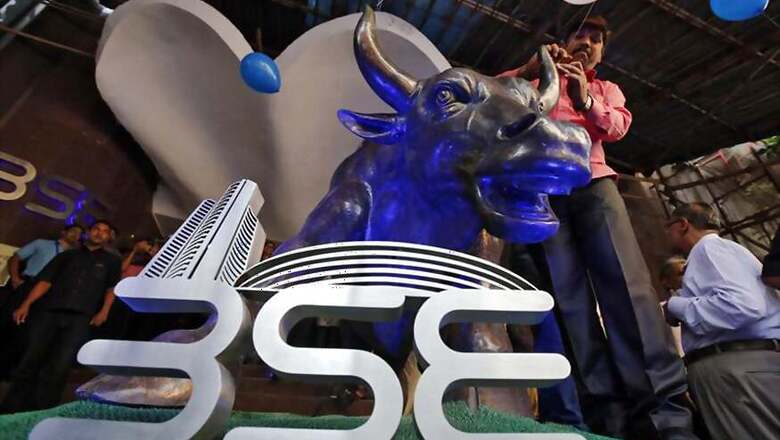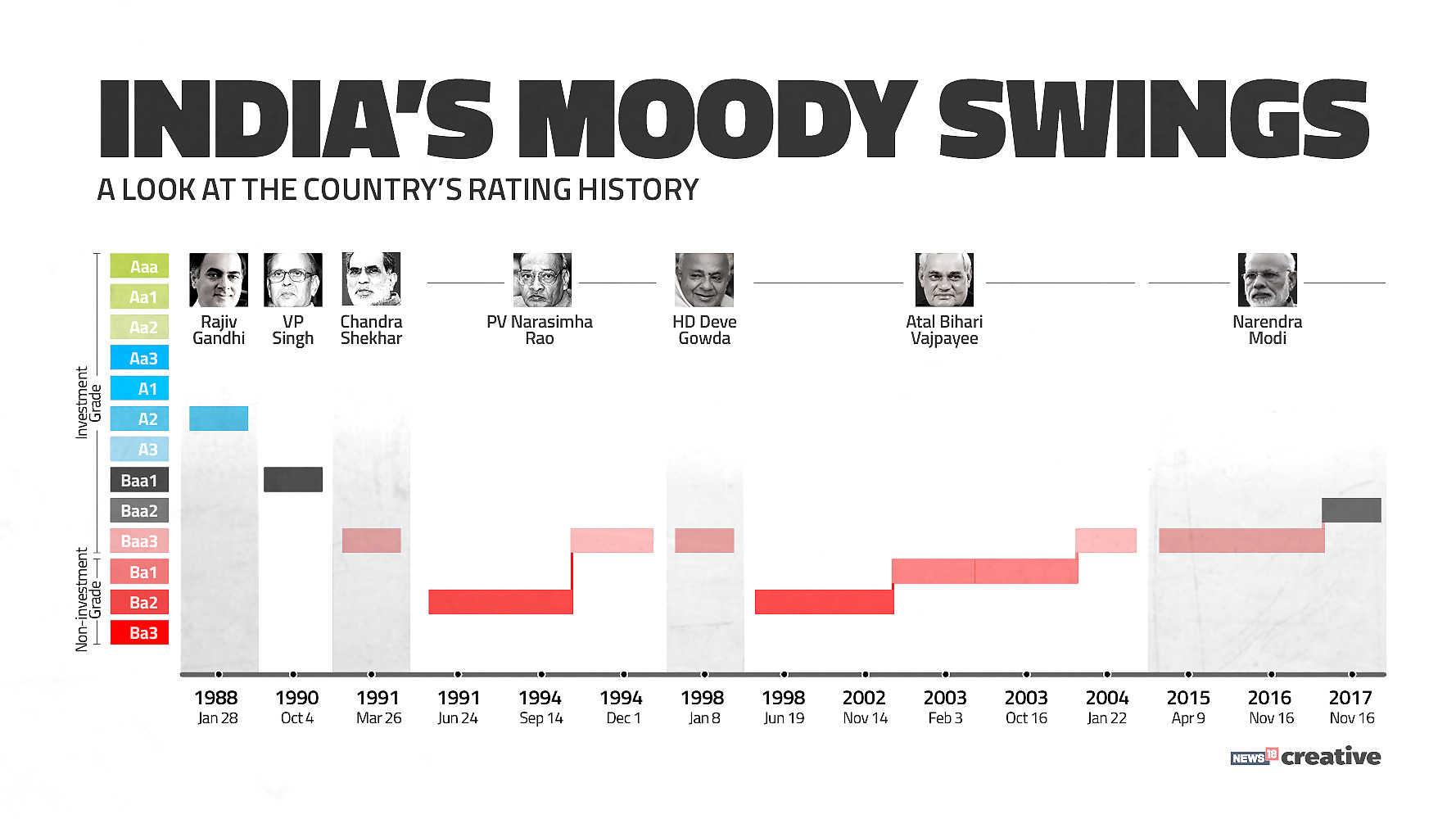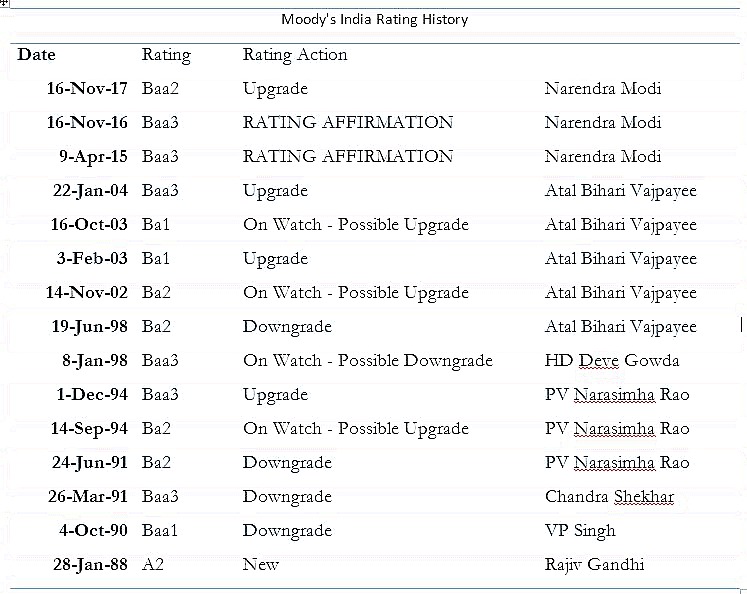
views
New Delhi: Markets, including stocks and the rupee, rallied on Friday after Moody's upgraded India's sovereign bond rating and noted continued progress on economic and institutional reform will enhance India's high growth potential.
The 30-share Sensex climbed 414 points, or 1.25 per cent, to trade at 33,520.82. The gauge had rallied 346.38 points in the previous session. Banking behemoth SBI rallied 2.94 per cent while private peers ICICI Bank, Axis Bank, Yes Bank and IndusInd Bank soared up to 3.07 per cent. The 50-share Nifty leaped 124.40 points, or 1.21 per cent, to 10,339.15.
The rupee appreciated a sharp 69 paise, or 1.06 per cent, to trade at an over one-week high of 64.63 against the dollar. The rally was supported by the dollar selling by exporters and banks and the US unit's weakness against some currencies overseas.
US-based ratings agency, Moody's, on Friday upgraded India's sovereign credit rating by a notch to 'Baa2' after a period of 13 years, with a stable outlook citing improved growth prospects driven by economic and institutional reforms.
The rating upgrade comes after a gap of 13 years as Moody's had last upgraded India's rating to 'Baa3' in 2004. In 2015, the rating outlook was changed to 'positive' from 'stable'. The 'Baa3' rating was the lowest investment grade – just a notch above 'junk' status.

"The decision to upgrade the ratings is underpinned by Moody's expectation that continued progress on economic and institutional reforms will, over time, enhance India's high growth potential and its large and stable financing base for government debt, and will likely contribute to a gradual decline in the general government debt burden over the medium term," Moody’s said in a statement.
BJP leaders and Union ministers took to Twitter to laud the government's efforts and the report that throws a positive light on GST and other economic reforms.
BJP national president Amit Shah tweeted: "India’s largest ever increase in Ease of Doing Business rankings, Pew study ascertaining PM @narendramodi ji’s popularity, Moody’s upgrade are all reflections of Modi Govt’s hard-work and reform process."
Union Cabinet minister Piyush Goyal tweeted: "Reforms like GST and dementisation help improve India's sovereign rating after more than a decade."
India’s largest ever increase in Ease of Doing Business rankings, Pew study ascertaining PM @narendramodi ji’s popularity, Moody’s upgrade are all reflections of Modi Govt’s hard-work and reform process.— Amit Shah (@AmitShah) November 17, 2017
Recognising India's growth enhancing reforms under PM @narendramodi, Moody’s has upgraded India’s sovereign rating for the first time since 2004. Entire world is recognising "Sabka Saath, Sabka Vikas".— Piyush Goyal (@PiyushGoyal) November 17, 2017
The global ratings agency, however, cautioned that high debt burden remains a constraint on the country's credit profile.
"Moody's believes that the reforms put in place have reduced the risk of a sharp increase in debt, even in potential downside scenarios," it said.
Moody's Investors Service upgraded the Government of India's local and foreign currency issuer ratings to 'Baa2' from 'Baa3' and changed the outlook on the rating to stable from positive, the statement said.
Stating that reforms will foster sustainable growth prospects, the US-based agency said the government is mid-way through a wide-ranging programme of economic and institutional reforms.
"While a number of important reforms remain at the design phase, Moody's believes that those implemented to-date will advance the government's objective of improving the business climate, enhancing productivity, stimulating foreign and domestic investment, and ultimately fostering strong and sustainable growth," Moody’s said.

The reform programme will thus complement the existing "shock-absorbance capacity" provided by India's strong growth potential and improving global competitiveness, it added.
Reforms like Goods and Services Tax (GST) will promote productivity by removing barriers to interstate trade.
Also improvements to the monetary policy framework, measures to address the overhang of non-performing loans (NPLs) in the banking system and those like demonetisation, the Aadhaar system of biometric accounts, and targeted delivery of benefits through the Direct Benefit Transfer (DBT) system are intended to reduce informality in the economy.
Other important measures which have yet to reach fruition include planned land and labor market reforms, which rely to a great extent on cooperation with and between the states, it said.
"Most of these measures will take time for their impact to be seen, and some, such as the GST and demonetisation, have undermined growth over the near term," it added.
Moody's expects GDP growth to moderate to 6.7 per cent in the fiscal year ending in March 2018.
However, as disruption fades, assisted by recent government measures to support SMEs and exporters with GST compliance, real GDP growth will rise to 7.5 per cent next fiscal, with similarly robust levels of growth from FY2019 onward.
"Longer term, India's growth potential is significantly higher than most other Baa-rated sovereigns," Moody’s noted.
(With agency inputs)















Comments
0 comment